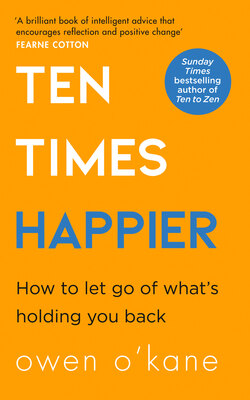Читать книгу Ten Times Happier - Owen O’Kane - Страница 17
CASE STUDY
ОглавлениеIn the introduction, I promised some real-life case stories on how my approach impacts and influences lives for the better. In my line of work as a psychotherapist I have learnt that you sometimes must be brave enough to appropriately share parts of your own story and that’s what I want to start by doing. It is often easy for professionals like me to hide behind our titles. However, we are human beings. We are all in this life together, making our way through and trying to make sense of it all. If I am going to invite you to listen to my teachings and experiences, then I equally owe it to you to share some of my story at times.
When I was a young boy I was severely bullied at school. I was different from the other kids in Belfast. I was learning to play piano, loved the theatre and never quite understood why the other boys wanted to run after a ball as a means of entertainment! I’m still working on that. Of course, they didn’t understand me either. I was the 1970s equivalent of Billy Elliot minus the dance moves. I lived in a world of make-believe, while many of the other kids were living in a different world.
After many years of bullying, rejection and humiliation, I started to ask questions such as, ‘Am I good enough? Am I the problem? Why don’t I fit it?’ I wasn’t happy.
Fast-forward to my adult years and of course this part of my past travels with me, like a hanger-on at a party. I realize that I sometimes doubt myself and feel anxious. It was in my own therapy I discovered that I didn’t have to live by some of my inherited rules and beliefs about fitting in or pleasing people. I discovered I was good enough and that the problem wasn’t me. Other people who couldn’t tolerate difference were the problem.
If I had made the choice to continue listening to this message from my past then I wouldn’t have gone to university, created a nice life and become a successful therapist and writer. I made the conscious decision to acknowledge the hurt this part of my past caused but it didn’t have to define my future or block my happiness. I had to practise the letting go I talk about. I had to learn new flexible rules and most importantly I had to learn to accept and like myself. Happiness for me truly is an ‘inside job’.
Another part of my past also worth sharing is my growing up in Northern Ireland during The Troubles. Living in Belfast during an intense period of bombs and bullets was a scary experience. I learnt from a very young age that life wasn’t safe and threat was everywhere. To be fair, during that time there was some truth in this. Yet when I moved away from Northern Ireland I had to learn to start letting go of this part of my past otherwise all of life would appear a threat. It’s difficult to feel happy if under threat.
When I moved to London I went to see my first ever West End show with a friend. I was ecstatic and the moment of entering the theatre was one of the best of my life. This was the stuff I had dreamt of as a child. However, it was short lived. The opening scene of the play had an unexpected gunshot sound and I instantly jumped to the floor. No one else budged! Yes, all my street credibility was lost in a moment and you can imagine some of the strange glances from the surrounding audience as they wondered about the strange man on the floor.
That strange man on the floor was hardwired to fear loud bangs, traumatized from an early life of bombs in Belfast. I had to relearn that not all loud noises were a threat. My anxious brain had to be rewired from earlier traumas. This was a part of my past I had to deal with.
Experience has taught me to use this part of my past in my work as a therapist to help other people manage anxiety. I didn’t have to be defined by a negative aspect of my past. Neither do you. Whatever has happened in your past, it doesn’t have to define you.
There is a wise expression: ‘Don’t look back, you’re not going that way.’ Sometimes we have to look back but it doesn’t mean we should keep looking there. The people in my depression therapy group decided to stop looking back and it became their way forward. I now pass this insight on to you. The past is over. You can rewrite your rules. You can let go of the difficult stuff. You are not going that way any more.
Where we will go next, though, is to your mind. Together we can explore how it may also be getting in the way of your happiness and what you can do about that.
